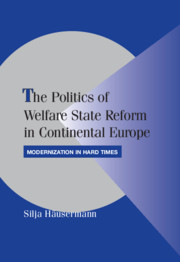Book contents
- Frontmatter
- Contents
- List of Figures
- List of Tables
- Preface
- The Politics of Welfare State Reform in Continental Europe
- 1 “EPPUR SI MUOVE”: WELFARE STATE CHANGE DESPITE INSTITUTIONAL INERTIA
- 2 MODERNIZATION IN HARD TIMES: THE POST-INDUSTRIAL POLITICS OF CONTINENTAL WELFARE STATE REFORM
- Part I Pension Reform in Continental Europe: A Framework of Analysis
- Part II Determinants of Successful Pension Reform in Continental Europe
- 6 FRANCE: TRADE UNION FRAGMENTATION AS AN OPPORTUNITY FOR REFORM
- 7 GERMANY: INSTITUTIONAL OBSTACLES TO MULTIDIMENSIONAL REFORM POLITICS
- 8 SWITZERLAND: RECALIBRATION AS AN ENABLING MECHANISM OF PENSION COMPROMISES
- 9 CONCLUSION: REFORM OUTPUTS AND POLITICAL IMPLICATIONS
- Appendices
- References
- Index
- Cambridge Studies in Comparative Politics
6 - FRANCE: TRADE UNION FRAGMENTATION AS AN OPPORTUNITY FOR REFORM
Published online by Cambridge University Press: 06 July 2010
- Frontmatter
- Contents
- List of Figures
- List of Tables
- Preface
- The Politics of Welfare State Reform in Continental Europe
- 1 “EPPUR SI MUOVE”: WELFARE STATE CHANGE DESPITE INSTITUTIONAL INERTIA
- 2 MODERNIZATION IN HARD TIMES: THE POST-INDUSTRIAL POLITICS OF CONTINENTAL WELFARE STATE REFORM
- Part I Pension Reform in Continental Europe: A Framework of Analysis
- Part II Determinants of Successful Pension Reform in Continental Europe
- 6 FRANCE: TRADE UNION FRAGMENTATION AS AN OPPORTUNITY FOR REFORM
- 7 GERMANY: INSTITUTIONAL OBSTACLES TO MULTIDIMENSIONAL REFORM POLITICS
- 8 SWITZERLAND: RECALIBRATION AS AN ENABLING MECHANISM OF PENSION COMPROMISES
- 9 CONCLUSION: REFORM OUTPUTS AND POLITICAL IMPLICATIONS
- Appendices
- References
- Index
- Cambridge Studies in Comparative Politics
Summary
This chapter analyzes French pension politics since 1970. It starts by providing empirical evidence that targeting and capitalization have become new conflict lines in French pension politics, dividing trade unions (and to a lesser extent employers) according to skill levels and the insider-outsider status of their members. A second section shows how conservative governments repeatedly succeeded in exploiting these intra-labor divides by designing reform packages, which confronted the left with the dilemma of having to choose between either old class loyalties or modernizing cross-class compromises. The choices the actors made and the consequences therefrom are then explained with reference to trade union fragmentation and the institutional framework of decision making: reformist trade unions approved the reforms, against the industrial trade unions and left-wing parties. Hence, if – and only if – the governments are willing and able to exploit the multidimensionality of the pension policy-making space, pension reform in France becomes possible.
From the 1970s onward, the French pension system underwent far-reaching reforms, as did many other fields of social security in France (see, e.g., Levy 2000; Palier 2002; Vail 2004). The following section provides an overview of these pension reforms. The debate in the 1970s was based on a certain consensus that pension levels had to be raised and that the pension system was, in general, underdeveloped. However, the left and the right claimed different levels of expansion, and the generous reforms of the right-wing Union pour la Démocratie Française (UDF) and Rassemblement pour la République (RPR) governments in the 1970s were, to some extent, a strategy to counter the more radical demands of the trade unions and the socialist and communist parties.
- Type
- Chapter
- Information
- The Politics of Welfare State Reform in Continental EuropeModernization in Hard Times, pp. 99 - 125Publisher: Cambridge University PressPrint publication year: 2010

